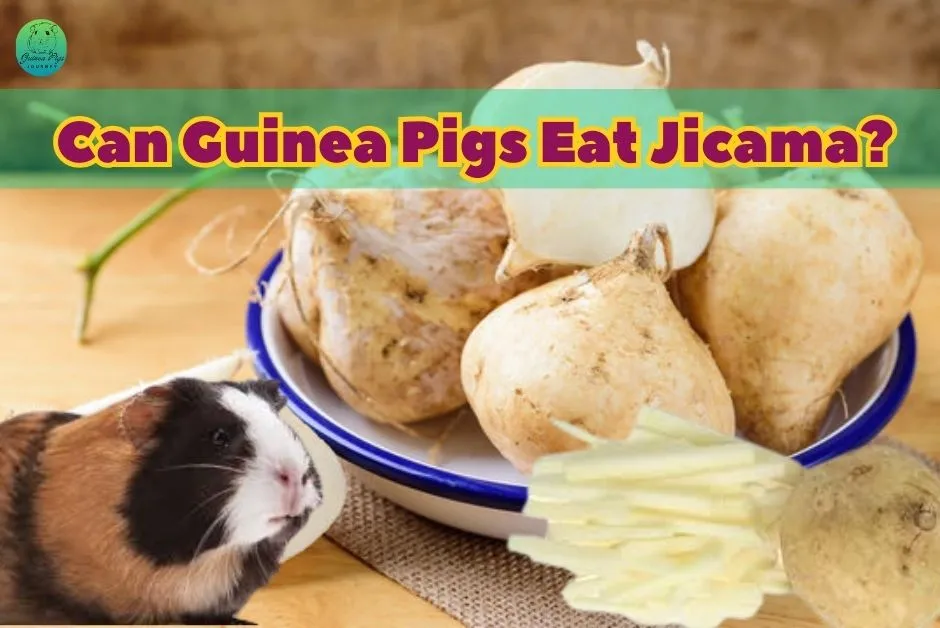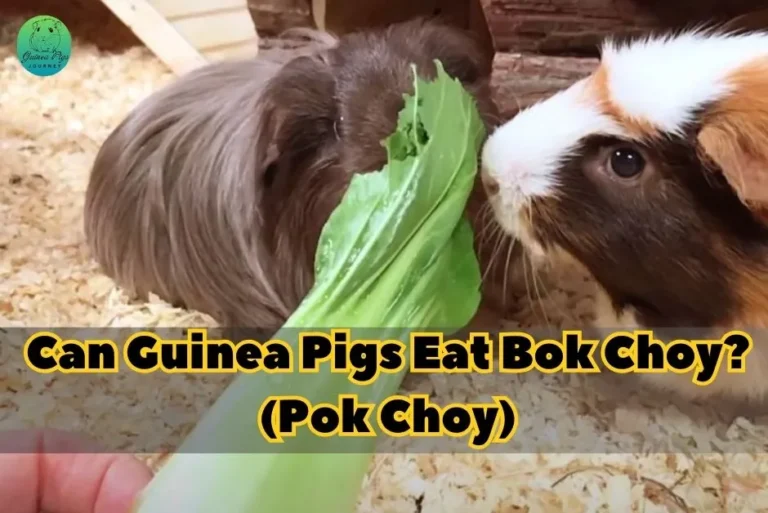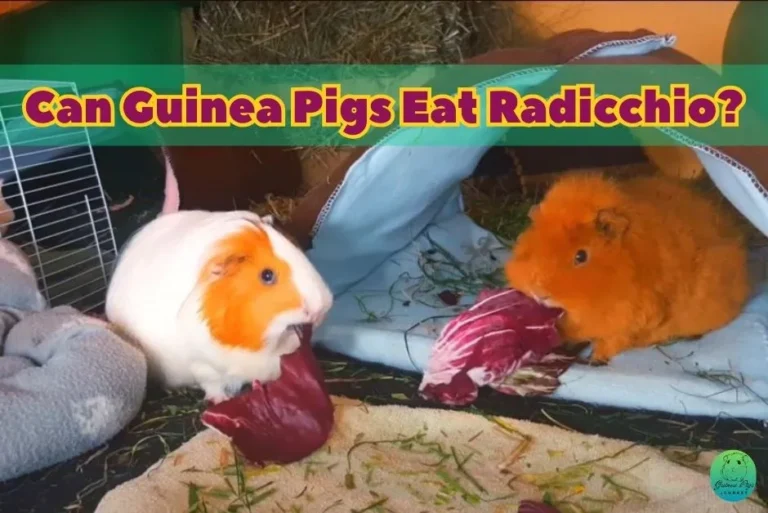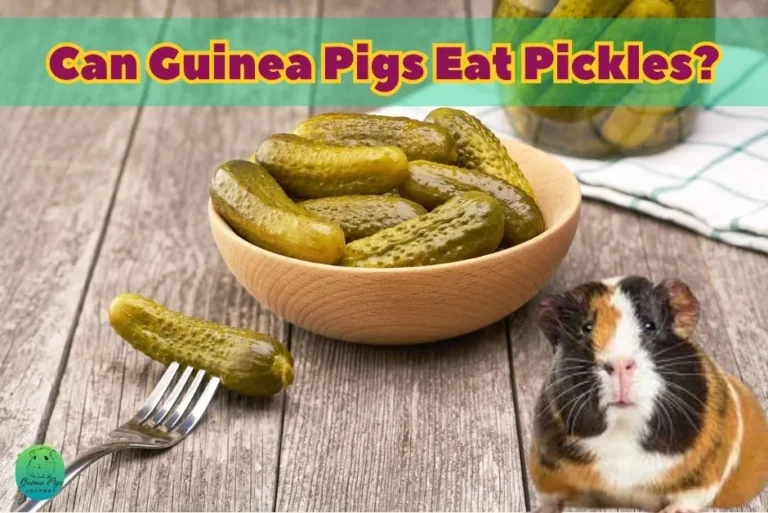Jicama! A global-shaped root vegetable native to Mexico with papery, golden brown skin and a starchy white interior. Its flesh is juicy and crunchy with a slightly sweet and nutty flavor. Other names for jicama include yam bean, Mexican potato, Mexican water chestnut, and Chinese turnip. Having such a sweet, crunchy, and juicy flavor veggetable like Sugar Snap Peas, Arugula, Asparagus, Mustard greens, Zucchini, Broccoli, etc. makes us think about jicama for guinea pigs and wonder a question; can guinea pigs eat jicama?
Yes, if properly prepared and offered in moderation, guinea pigs can eat raw jicama as an occasional treat to enhance the nutritional boost as well as variety in their diet. Jicama for guinea pigs contains vitamins, minerals, antioxidants, and beneficial fiber. It may benefit their heart health and gut microbiome as part of a nutritious diet if offered in moderation.
Although jicama is safe to feed your guinea pigs, it also contains some risk factors and important considerations that are very important to understand and bear in mind before deciding to offer jicama in the guinea pigs’ diet. This long guinea pig journey and experience has made me do thorough research on any new food including jicama for guinea pigs and led me to a desire to support and share such valuable knowledge with my fellow guinea parents about jicama for the safety of these little creatures.
Is Jicama Safe For Guinea Pigs?
Yes, Jicama is safe to offer your guinea pigs in moderation after peeling their skin. Jicama is a good source of vitamin C, fiber, and antioxidants but excessive feeding of jicama can be very dangerous for guinea pigs leading to diarrhea, stomach upset, bloating, gastric issues, and other health-related issues, so it is always recommended to serve any food in limited and small quantity to ensure moderation.
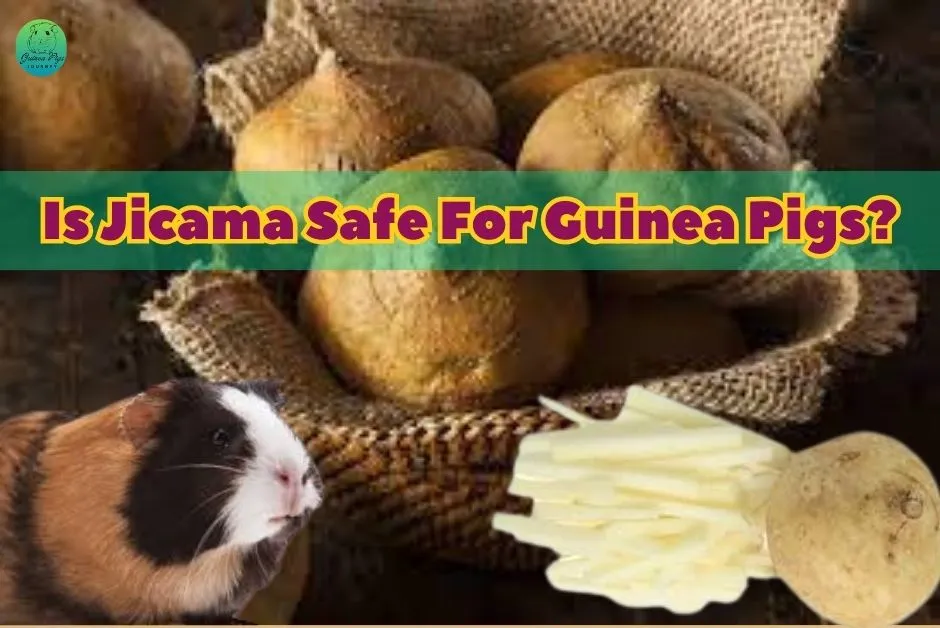
It is also advised to avoid offering cooked, processed, or pickled jicama as it is very harmful to guinea pigs’ health. It is never safe to feed the leaves, beans, and peel or skin of jicama because it contains some toxic substances like rotenone which can cause harmful effects and make the sick even leading to the death of guinea pigs.
Nutritional Requirements of Guinea Pigs:
Guinea pigs require very careful and responsible treatment when offering any new food due to their delicate and sensitive nutritional and digestive requirements, so understanding their best and recommended diet is crucial for a responsible owner. It is pertinent to mention here that they must know about those foods not recommended to feed guinea pigs and what is the best way to feed a safe and recommended food to guinea pigs to achieve the optimum nutritional benefits for fulfilling the nutritional requirements of guinea pigs.
In general, Guinea pigs require good quality hay which makes up 80-90 % of most of their diet along with 10 % of fresh and good quality fruits, leafy greens, and vegetables like cilantro, rosemary, basil, dandelions, wheatgrass, etc. as a treat in moderation. Guinea pigs can also be served with some amount of only dedicated guinea pig pallets but it should not be part of their main staple and should be served the recommended portion or mentioned on pallets bag for guinea pigs. Guinea pigs should also be served with fresh, clean, chlorine-free drinking water at all times and must be checked and changed twice a day for their good health.
Jicama for guinea pigs can be a healthy and nutritious addition in moderation and may serve many health benefits. This root vegetable is low in calories and high in fiber and water, making it a weight-loss-friendly food for your guinea pig.
Nutritional Analysis of Jicama for Guinea Pigs:
Jicama for guinea pigs in moderation contains many important nutrients, minerals, and vitamins as well as a significant amount of fiber and most of its calories come from carbs. The rest are from very small amounts of protein and fat. Most of its calories come from carbs. It is low in calories and high in fiber and water. It also contains antioxidants, including vitamins C and E and beta-carotene. According to the USDA Food Data Central, listed below are the nutritional values and percentages per 100-gram serving of raw jicama for guinea pigs to understand these nutrients before deciding to introduce it in their diet plan.
| Nutrients | Value per 100 grams | Daily Value / 100 gm. (DV %) |
| Calories | 38 kcal | |
| Carbohydrates | 8.82 grams | 3 % |
| Water | 90.1 grams | |
| Fat | 0.09 gram | 0 % |
| Protein | 0.72 gram | 1 % |
| Dietary Fiber | 4.9 grams | 18 % |
| Sugar | 1.8 grams | |
| Net Carbs | 3.92 grams | |
| Vitamin C, total ascorbic acid | 20.2 mg | 22 % |
| Vitamin A, RAE | 1 µg | 0 % |
| Vitamin E | 0.46 mg | 3 % |
| Vitamin K | 0.3 µg | 0 % |
| Vitamin B-6 | 0.042 mg | 2 % |
| Vitamin D | 0 mcg | 0 % |
| Cholesterol | 0.00 mg | 0 % |
| Fatty Acid (Saturated) | 0.021 g | 0 % |
| Folate | 12 µg | 3 % |
| Calcium, Ca | 12 mg | 1 % |
| Phosphorus, P | 18 mg | 1 % |
| Potassium, K | 150 mg | 3 % |
| Iron, Fe | 0.6 mg | 3 % |
| Magnesium, Mg | 12 mg | 3 % |
| Zinc, Zn | 0.16 mg | 1 % |
| Sodium, Na | 4 mg | 0 % |
| Copper, Cu | 0.048 mg | 6 % |
Note: * The % Daily Value (DV) indicates how much a nutrient in a serving of food subsidizes a daily diet.
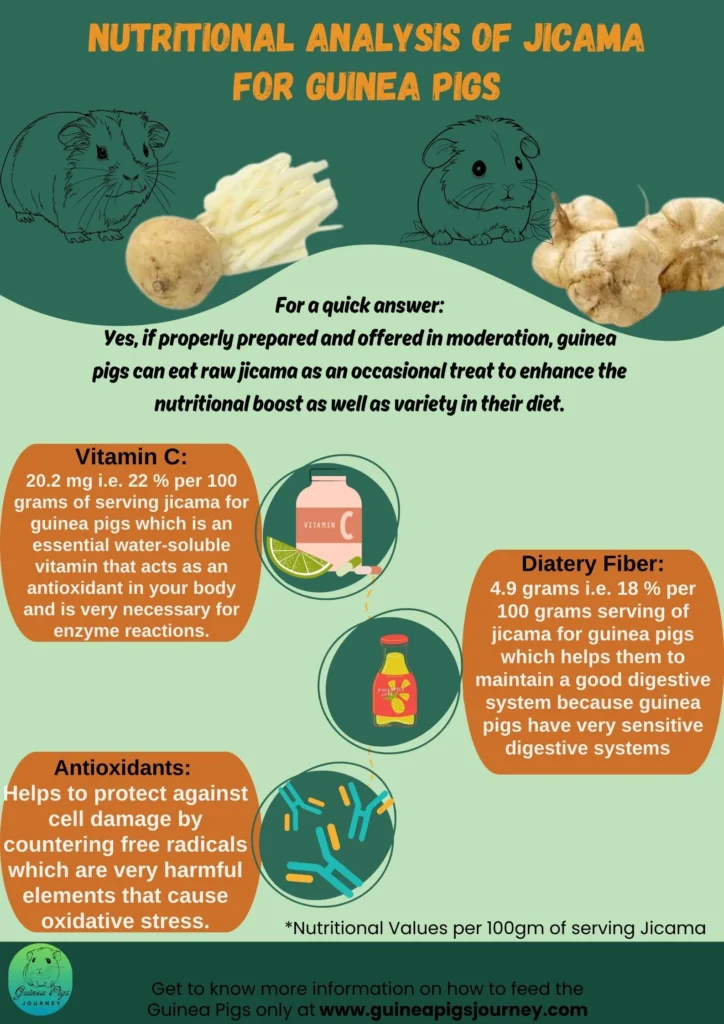
What Are The Nutritional Benefits Of Jicama For Guinea Pigs?
Vitamin C:
Jicama for guinea pigs is an excellent source of vitamin C containing almost 20.2 mg i.e. 22 % per 100 grams of serving jicama for guinea pigs which is an essential water-soluble vitamin that acts as an antioxidant in your body and is very necessary for enzyme reactions. Vitamin C helps guinea pigs protect from scurvy and boost their immune system.
Dietary Fiber:
Jicama for guinea pigs is also a good source of dietary fiber and contains almost 4.9 grams i.e. 18 % per 100 grams serving of jicama for guinea pigs which helps them to maintain a good digestive system because guinea pigs have very sensitive digestive systems. The type of dietary fiber called inulin in jicama which is a prebiotic fiber if offered in moderation helps guinea pigs to increase the frequency of bowel movements. A diet high in prebiotics increases the population of “good” bacteria in their gut and decreases the number of unhealthy bacteria. A good type of bacteria helps lower the risk of chronic diseases like heart disease, diabetes, obesity, and kidney disease.
Antioxidants:
Jicama for guinea pigs also contains antioxidants which help to protect against cell damage by countering free radicals which are very harmful elements that cause oxidative stress. Oxidative stress is linked to chronic diseases including cancer, diabetes, cardiovascular and cognitive decline.
What Other Benefits Does Jicama Provide For Your Guinea Pig?
Jicama is low in calories and high in fiber and water. It also contains antioxidants, including vitamins C and E and beta-carotene. The significant amount of soluble dietary fiber in jicama for guinea pigs may help lower cholesterol levels by preventing bile from being reabsorbed in the intestines, as well as preventing the liver from making more cholesterol. Jicama also contains potassium, which helps lower blood pressure by relaxing the blood vessels in guinea pigs.
Jicama is a nutrient-dense food. It contains a high number of nutrients but a relatively low number of calories and is high in fiber and water. Studies show that eating jicama can decrease blood sugar levels, improve insulin sensitivity, and help you feel full longer.
What Are The Risks Of Jicama For Guinea Pigs?
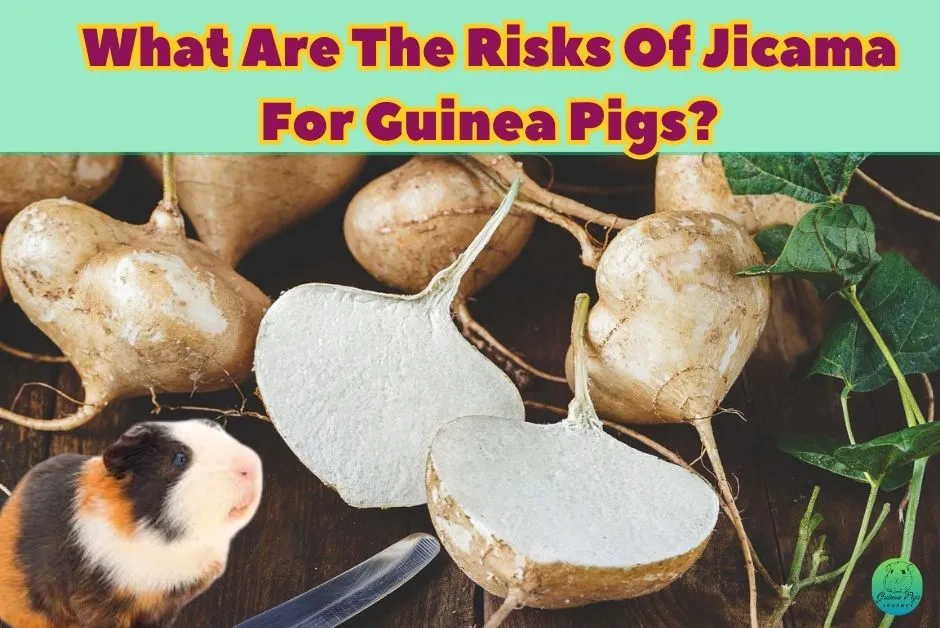
Toxic Properties:
All parts of jicama are not safe to feed your guinea pigs like leaves, flowers, and skin or peel of jicama contain toxin elements known as rotenone which can be harmful to your guinea pigs if fed leading to many complications like stomach aches, rashes, diarrhea, and many other health-related issues which may even lead to death of your guinea pig. So, need to be more careful before offering jicama to your guinea pig.
Digestive Issues:
Jicama may also cause digestive upset like constipation and stomach ache if fed in excess amounts to your guinea pigs due to the high fiber content because too much fiber in their diet can interfere with the absorption of minerals such as calcium, iron, zinc, and magnesium.
Obesity, Weight Gain, and Diabetes:
Jicama also contains a decent amount of sugar content which is a serious concern for ensuring moderation while offering jicama for guinea pigs, whereas jicama in excess amount can contribute to obesity and weight gain which can subsequently lead to a dangerous disease like diabetes.
How Often Can Guinea Pigs Eat Jicama? (Frequency and Size of Serving Jicama)
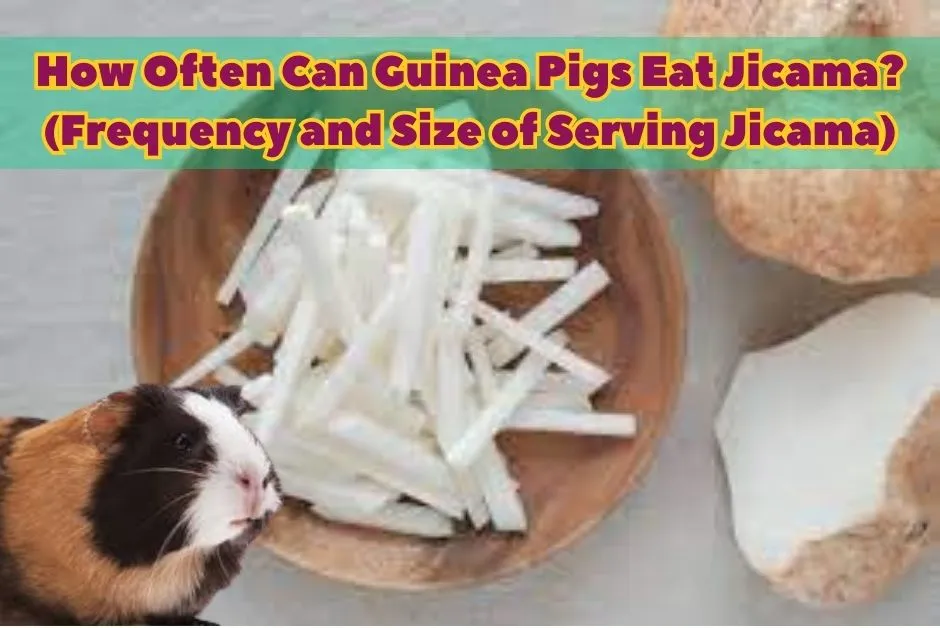
It is very important to ensure moderation before serving jicama to guinea pigs. The recommended frequency and size of serving jicama for each guinea pig is about one or two inches of the fleshy part without skin, flowers, leaves, and vines, not more than 1-2 times a week to ensure moderation.
It is not recommended to serve jicama as a regular food, it should be served as an occasional treat for your guinea pigs.
How Much Jicama Can Guinea Pigs Eat A Time?
It is recommended to serve not more than one or two inch-sized fleshy parts of jicama for guinea pigs by cutting them into small pieces so that they can enjoy this treat.
You can also serve ½ amount in the morning and the other half in the evening by mixing with other suitable vegetables and leafy greens like Green beans, zucchini, broccoli, pumpkin, butternut squash, etc. to add the nutritional boost and variety in their diet.
Can Guinea Pigs Eat Jicama Every Day?
No, generally it is not recommended to offer jicama every day to your guinea pigs due to the high fiber and sugar content which may lead to various health complications including digestive issues, bloating, obesity, weight gain, and gastric issues. It is recommended to ensure moderation and serve them the recommended size and frequency to ensure their safety and good health.
Can Guinea Pigs Eat All Parts Of Jicama?
It is very crucial to know and understand all parts of jicama before serving them to guinea pigs as all parts are not safe to feed your guinea pigs, so let’s know which part of jicama is safe to offer your guinea pigs.
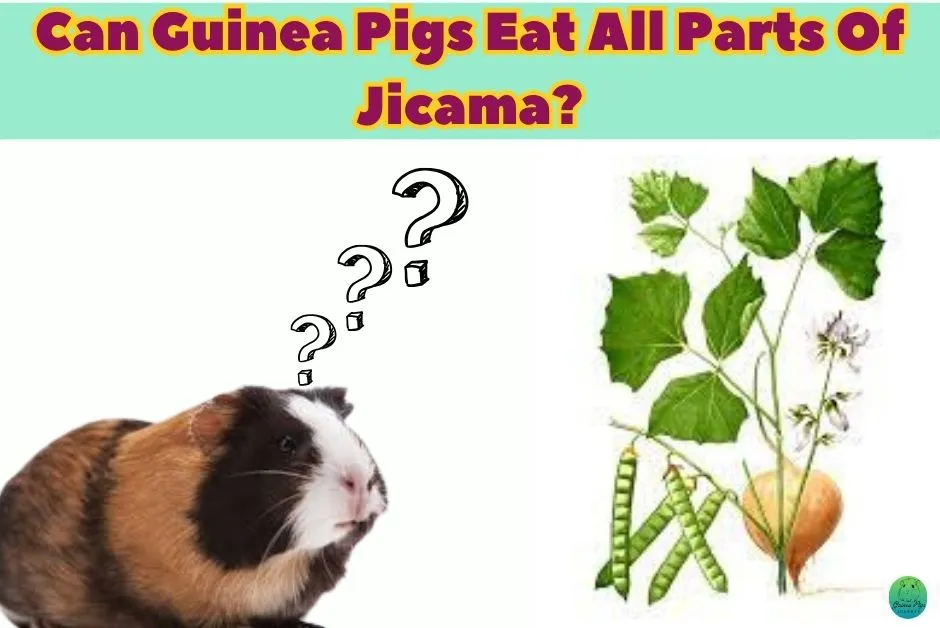
Can Guinea Pigs Eat Jicama Flesh Part?
Yes, Jicama Flesh is the safest and secure part to feed your guinea pigs but moderation and gradual introduction is the key to serving. The fleshy part of jicama offers numerous nutrients like vitamin C, minerals, and antioxidants beneficial for the overall health of guinea pigs.
Can guinea Pigs Eat Jicama Roots?
Yes, the roots of jicama are safe to feed your guinea pigs in moderation. In a recent research review, the plant was noted for its antioxidant and anti-aging effects and ability to support immune function and protect against chronic diseases. It’s similar to white potatoes but with fewer calories and carbohydrates.
Can guinea Pigs Eat Jicama Leaves and Vines?
No, do not feed jicama leaves and vines to your pets like guinea pigs due to the rotenone a toxin element in jicama leaves and vines which is very dangerous for guinea pigs and can lead to digestive disorders like constipation and stomach ache.
Can guinea Pigs Eat Jicama Skin or Peel?
No, it is not recommended to feed the peel or skin of jicama because it contains a toxin element known as rotenone which can cause serious health-related issues if ingested like bloating, diarrhea, allergic reactions, etc.
Can guinea Pigs Eat Jicama Seeds?
No, just like all parts except the flesh and roots of jicama without skin the seeds of jicama also contain the toxin rotenone, which is used to poison insects and fish. So, do not feed the seeds of jicama to your guinea pigs as it can also cause choking hazards.
Can guinea Pigs Eat Jicama Flowers?
No, it is not recommended to feed jicama flowers to your guinea pigs because just like the skin or peel of the jicama, the flowers of jicama also contain rotenone which is very dangerous for humans as well as for the sensitive digestive system of guinea pigs and their overall health.
Can guinea Pigs Eat Jicama Pickles?
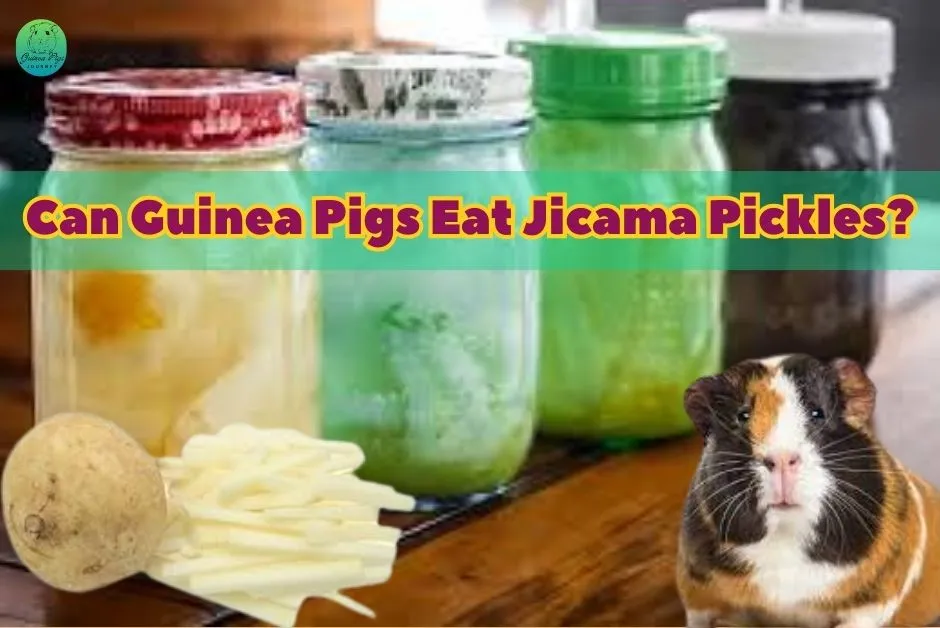
No, not at all, do not feed your guinea pig any kind of pickle including jicama pickles to your guinea pigs because jicama pickles are so acidic and salty as well as go through the marinating process and contain preservatives, chemicals, and other substances that can cause severe health issues like bloating, diarrhea, gastric issues, digestive upset, etc.
Can guinea Pigs Eat Dried Jicama?
No, It is not recommended to feed dried jicama to your furry friend’s guinea pigs because they are already rich in sugar content and after going through the dried process of jicama can add much more sugar which if ingested can be very dangerous and may lead to weight gain, obesity, and even diabetes.
Can guinea Pigs Eat Jicama Fries?
No, not at all, guinea pigs should not be served with jicama fries as they may contain salts, oil, spices, etc. which are very bad for your guinea pigs as guinea pigs with a very sensitive digestive system cannot easily go through any food contains salts, oils, any fried food, or fast food. It is recommended to offer your guinea pig raw, fresh, and organically produced jicama for guinea pigs.
Can guinea Pigs Eat Canned Jicama?
No, it is not recommended to feed canned jicama to your guinea pigs because canned jicama contains preservatives, additives, flavors, and chemicals which can be dangerous for your guinea pigs’ sensitive digestive system.
Can guinea Pigs Eat Cooked or Processed Jicama?
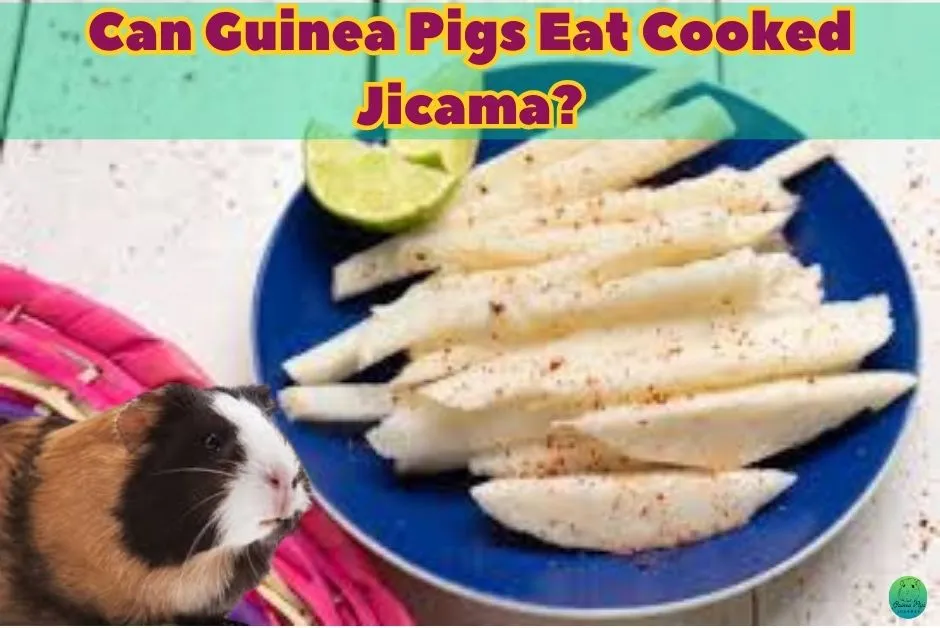
No, do not feed your guinea pigs cooked or processed jicama because it contains some salts, seasoning, oil, flavors, etc. which can be dangerous for the sensitive digestive system of guinea pigs.
Can Baby Guinea Pigs Eat Jicama?
It is best to avoid feeding jicama to Baby guinea pigs (Pups) because jicama is high in sugar and fiber which baby guinea pigs cannot tolerate easily leading to serious complications.
You can start offering the jicama to baby guinea pigs at the age of almost 4-6 weeks old. Remember, introduce the jicama gradually and see the reaction of baby guinea pigs. If you observe any change or reaction, immediately run to the veterinarian for guidance and a check-up.
How to Prepare Jicama for Guinea Pigs?

- Purchase/choose a good quality and fresh, healthy, and most importantly organically produced jicama roots for guinea pigs from a verified dealer or store. Ensure that jicama roots are not overly wilted and spoiled as it can make them sick.
- Thoroughly wash the jicama in cold running water to remove any dust particles, chemicals, pesticides, or traces of germs, and let them dry after washing before serving.
- Remove or Peel the skin of jicama as it is toxic for guinea pigs. Also remove the leaves, flowers, and vines to avoid feeding them.
- Cut the fleshy part of jicama into small pieces as a treat. You can mix it with other healthy vegetables to add variety to their diet in moderation.
- It is very important after preparing jicama, to introduce it in appropriate quantity to ensure moderation and if it is their first time then introduce a small portion i.e. one-inch jicama for each guinea pig, and observe their reaction to adopting this new diet.
- You can also serve them like ½ amount in the morning and the other half in the evening to ensure moderation and gradual introduction.
- In the end, the most important task to do is when your guinea pigs are done eating jicama, be sure to check and remove the uneaten jicama from the cage or their surroundings to avoid the multiplication of bacteria and inviting flies that can be harmful to guinea pigs.
Healthy Alternatives to Jicama for Guinea Pigs:
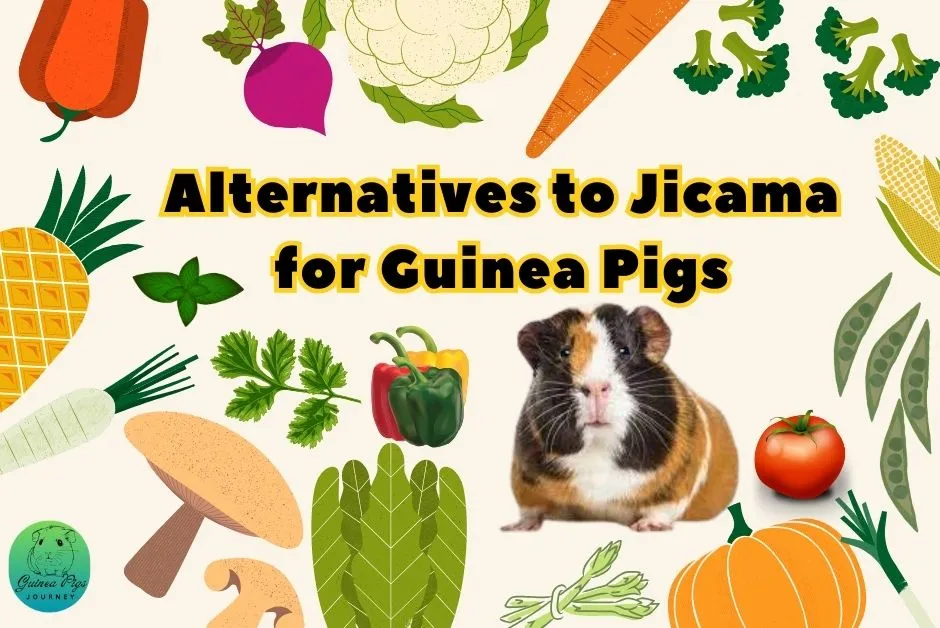
There are plenty of other alternatives if your guinea pig is not crazy about jicama to eat. Just like jicama, these foods also provide nutrient-rich elements but different in quantity that can boost health in many ways of your Guinea pigs. Here are some good and healthy alternatives such as fruits, leafy greens, or vegetables to consider when preparing a salad in moderation for your cavies;
| Blackberries | Rutabagas, raw | Brussels Sprouts | Pears |
| Endive, raw | Nectarines | Basil | Cucumber |
| Honeydew Melon | Beetroot (occasionally) | Cherries | Red and Green Bell Peppers |
| Kale, raw | Arrowroot, raw | Dandelions | Broccoli Rabe |
| Arugula | Tomatillos, raw | Zucchini | Green Beans |
| Dragon Fruit | Cauliflower | Rosemary | Snap Peas |
| Pomegranate | Radicchio, raw | Oregano | Thyme |
| Grapefruit | Turnips | Cilantro | fennel |
Conclusion: Jicama For Guinea Pigs
Overall, it is ok to feed only root or flashy parts of jicama after peeling their skin to your guinea pigs in moderation as an occasional treat. Make sure that this should not be the main staple or regular part of their diet. Some think it tastes like a cross between a potato and a pear. Others compare it to a water chestnut. Jicama contains vitamins, minerals, and beneficial fiber for guinea pigs. Do not feed outer skin, leaves, and flowers to your guinea pigs as they contain a toxin element called rotenone which can be dangerous for guinea pigs’ overall health.

